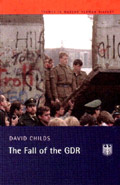Author's response
| Book: | The Fall of the GDR: Germany's Road to UnityDavid ChildsLongman, 2001 ISBN 058231569; pp. xvii+188, 2001 |
| Reviewer: | Jan PalmowskiDepartment of German, Kings College, London |
I agree with Jan Palmowski that here and there I could have structured the book more logically. I also agree with him that my chapter on the birth of the opposition parties was brief. This was because, in retrospect, they were far less significant than they appeared at the time. I plead guilty to the charge of trying to make The Fall of the GDR readable. I have attempted to make all of my twenty or so books readable in the hope that they will be attractive to readers at all levels.
Let me explain that where I lapse into an 'imaginary anecdotal style' (suggesting what workers in 1988 or border guards in 1989 'perhaps' thought about events) this was not just my musing. The views put into the heads of others were based on interviews with a great many individuals including Stasi officers, SED members at various levels and people on the streets of Bautzen, Berlin, Chemnitz, Dresden and, above all, Leipzig. Although I cannot claim these were representative samples in terms of public opinion polling, I believe they were fairly representative. The Stasi officials and SED functionaries, did ask, so they told me, 'Where will it all end?' as each new step undermined the old power structures. I have met Stasi officers who admitted they were 'dazed' as events rapidly overtook them towards the end of 1989. At the time, I met SED members who turned to alcohol as they grappled to understand what was going on and feared the worst. Because of my limited funds and time, and the limited availability of some of those involved, in the main, I was interviewing for my earlier work, The Stasi (1996, 1999), and for The Fall of the GDR, at same time.
I do not think Jan is quite right to write that I placed undue importance on Thatcher (and others like the GDR ambassador and Bärbel Bohle) visiting Nottingham University in 1989 and 1990. It is simply that on that occasion Mrs Thatcher expressed her annoyance about attempts to raise 'the German question' and preferred things as they were. After all, she was the head of the British government, and potentially had much to say about any changes in the status of the two German states. Obviously, my interviews, mentioned in the acknowledgements, with Egon Krenz, Hans Modrow, Lothar de Maizière, Gerd Poppe, Wolfgang Ullmann and so many others informed my view of the events of 1989–90, but so did the works mentioned in the considerable bibliography and others I was not able to include.
As for Jan's final comment that there 'is no overreaching thesis', let me admit, that what I wanted to do was to present an accurate account of the downfall of the DDR. I always prefer to make any underlying theme or thesis implicit rather than explicit. In this case, it was that the DDR was an artificial construct, lacking popular support, which would fall once the Soviet Union withdrew its backing.
Undoubtedly, someone with more time and sources will write a much larger book about those most dramatic events that culminated in the restoration of German unity. Perhaps the archives will reveal some important new detail, on this or that aspect of the drama but, overall, I do not expect the story to change very much.
July 2002

